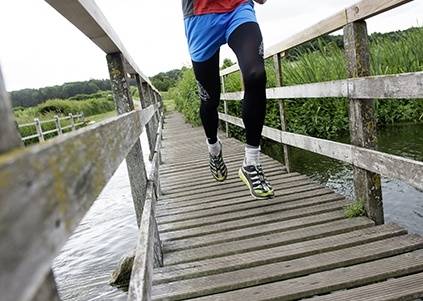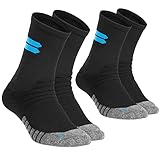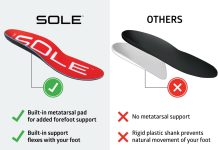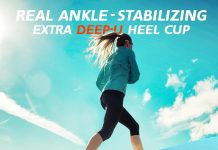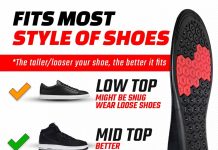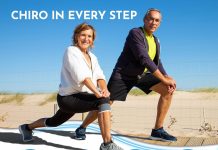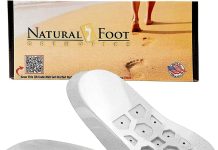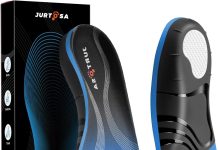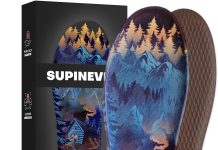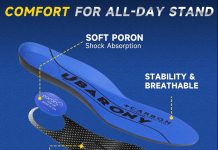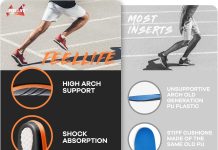The best blister-proof socks prevent nasty blisters from slowly rearing their ugly heads (as they always seem to) before sticking around for ages (seriously, they last forever).
Are you an avid runner, hiker, or just someone who enjoys a good stroll? If so, you know the pain and discomfort of blisters all too well.
Blisters can ruin even the most enjoyable activities by causing painful distractions that are hard to ignore.
Fortunately, there is a simple solution – choosing the right socks! This article will dive into the different types of socks that prevent blisters and help you choose which is best for your needs.
Say goodbye to pesky blisters and hello to happy feet with our guide on The Best Socks to Prevent Blisters!
Best Socks to Prevent Blisters
Regarding physical activities such as running and hiking, blister prevention is critical for maintaining comfort and avoiding potential injuries.
The right socks can make a significant difference in minimizing the risk of blisters and ensuring a pleasant and pain-free experience.
This guide will provide valuable insights into selecting the best anti-blinker socks for various activities and understanding the essential features of blister prevention.
1. ASICS Cushion Low Cut Sock
2. Bridgedale Xhale Speed Demon Socks.
3. Injinji Run No-Show Toes Socks.
4. Wrightsock Anti-Blister Double Layer Running Quarter Sock.
5. Drymax Sport Socks.
In the primary, the best socks to prevent blisters on any professional athlete’s foot are made without joints and utilize artificial materials that keep feet cool and dry.
What are the best socks to prevent blisters?
When it comes to preventing blisters, not all socks are created equal. The best socks to prevent blisters have certain features that differentiate them from regular everyday socks.
First and foremost, they should fit snugly around your foot without being too tight. This will reduce the amount of friction between your skin and the sock fabric, which is a common cause of blisters.
Another essential feature is its moisture-wicking ability. Socks that can effectively absorb moisture and keep your feet dry are less likely to cause blisters or other foot problems.
The material of the sock also plays a significant role in blister prevention. Look for socks made from synthetic materials like polyester or nylon, as these fabrics are more durable and less likely to rub against your skin than cotton or wool.
Consider specific areas on your feet where you tend to develop blisters most frequently – such as heels or toes – and choose socks with extra padding in those areas for added protection.
Choosing high-quality socks with these critical features can significantly decrease your risk of developing painful blisters while enjoying all your favorite activities!
How do you choose the right socks to prevent blisters?
When choosing the right socks to prevent blisters, there are a few key factors to consider. First and foremost, you want to make sure that your socks fit properly. Socks that are too tight or loose can cause friction against your skin, leading to blisters.
Choosing socks made from breathable materials such as cotton or wool is also essential. These materials help wick away moisture from your feet and keep them dry, which reduces the likelihood of blisters forming.
Another factor to consider is the thickness of your socks. While thicker socks may provide more cushioning for your feet, they can also increase friction and heat buildup inside your shoes. Thinner socks may be a better choice if you want a more excellent option.
Consider unique features explicitly designed for blister prevention, such as reinforced heels or toes, seamless construction, or extra padding in high-friction areas.
By considering these factors when choosing your socks, you’ll be well on your way to preventing those pesky blisters from forming during your next workout or outdoor adventure!
The different types of socks to prevent blisters
When it comes to preventing blisters, choosing the right type of socks is crucial. Several types of socks, each with unique features, can help prevent blisters.
1. Moisture-wicking socks: These socks are designed to keep your feet dry by wicking away moisture from your feet. They’re made with materials like polyester and nylon and are ideal for those who sweat a lot.
2. Double-layered socks: As the name suggests, double-layered socks have two layers of fabric, reducing friction between your skin and shoes and thus reducing the risk of blisters.
3. Toe-socks: Toe-socks separate each toe from one another, eliminating rubbing between toes and minimizing the chance of blisters forming in this area.
4. Blister-resistant socks: This kind is specifically designed with extra padding on areas prone to blistering, such as heels or balls-of-the-feet
Choosing the right type depends on where you experience most discomfort when wearing shoes; if it’s around your toes, go for toe-socks; if excessive sweating is an issue, opt for moisture-wicking or double-layered ones experiencing pain to shoe rub causing blistering.
Pros and cons of each type of sock
When choosing the right socks to prevent blisters, several different types are available on the market. Each sock type has advantages and disadvantages, so it’s essential to consider your needs before purchasing.
Firstly, cotton socks are one of the most common socks available. They’re affordable and easy to find in stores. However, they tend to hold onto moisture for extended periods, increasing your chances of blisters.
Secondly, wool socks have become increasingly popular due to their ability to wick away moisture from the skin effectively. This is great for those who engage in high-intensity activities as it helps regulate foot temperatures better than other options.
Thirdly, seamless socks are another option that can help minimize friction points on your feet where blisters tend to form. However, they may not be suitable for sensitive skin or allergies as they often contain synthetic materials.
Blister prevention-specific socks like Injinji toe-socks may offer additional cushioning at pressure points, reducing the chances of blister formation during exercise. Still, it will take time to get used to them while putting them on!
Each sock presents unique advantages and disadvantages when preventing blisters, depending on individual needs!
Which sock is best for you?
Choosing the right sock to prevent blisters is crucial for anyone participating in physical activities. The best sock depends on your activity, foot type, and preferences.
If you have a low arch or flat feet, socks with more cushioning will provide better support and prevent friction. However, thinner socks may be more comfortable with high arches or narrow feet.
For runners or hikers, synthetic materials such as polyester or nylon are recommended due to their moisture-wicking properties that keep feet dry and reduce blisters. On the other hand, natural fibers like wool offer insulation during colder temperatures but can retain moisture when wet.
Compression socks are beneficial for reducing muscle fatigue and increasing blood flow but may not necessarily prevent blisters unless they fit correctly.
Choosing a sock that fits well without bunching or slipping is essential while providing adequate cushioning in areas prone to blister formation. Trying different types of socks during activities can help determine which works best for you.
How to prevent blisters when wearing socks
Blisters can be painful and annoying when wearing socks. To prevent blisters, it is essential to take the necessary precautions.
Firstly, ensure your socks fit properly. Choose a pair of socks that conform to your foot’s shape and size. Ill-fitting socks that are either too loose or tight will cause friction and blisters.
Secondly, opt for moisture-wicking materials like merino wool or synthetic fabrics like polyester. Moisture-wicking materials help keep your feet dry by absorbing sweat from the skin’s surface, reducing the risk of blisters.
Thirdly, consider cushioned socks with added padding in areas where you’re prone to getting blisters. Cushioned socks provide extra support and reduce pressure on sensitive areas of your feet.
Change into fresh pairs of clean socks regularly throughout the day, or invest in anti-blister products such as blister pads or powders to prevent friction between your foot and sock.
These simple steps allow you to enjoy comfortable footwear without worrying about pesky blisters interfering with your daily activities!
Running Socks
Toe Socks: Runners who often get blisters on their feet and toes might desire to attempt toe socks.
Your best blister treatment for toe blisters might be socks– toe socks.
Path Running Socks: Socks for path runners must endure various weather conditions and running conditions, including snow, rain, mud, sand, and moving water.
Best Running Socks | Why do I get blisters?
Drymax ® Sports Socks is another brand name that prevents blisters and chafing by fending off the water and keeping feet cool and dry. ® For path runners.
Long-Distance Running Socks: The best running socks for marathoners should be made with artificial moisture-wicking materials to keep feet cool and dry over long durations.
Some businesses now bring dual-layered socks for long-distance running.
Biking Socks
Bicyclists must search for socks in artificial materials and non-slip cuffs to assist their socks in sitting tight.
A moving or bunching sock can trigger prominent foot blisters. The best socks for cycling offer proper seasonal convenience and prevent foot blisters.
Look for cold-weather socks that wick sweat. However, keep your feet warm.
A post on BicycleApparel.com exposes that numerous bicyclists will use two layers of socks: a thin sock liner beneath a thick insulating sock for cold-weather biking.
Trekking Socks
According to a short article by REI Seattle shoe expert Pete Smith, the best hiking socks to prevent blisters might depend upon the trekking you are prepared to do.
Brief walkings: Lightweight trekking socks are typically made with artificial, sweat-wicking materials, such as CoolMax ®, that keep feet dry and prevent blisters on feet.
Ensure the socks are tight and seam-free to lower rubbing.
Nevertheless, these thicker, warmer socks can trigger a more hospitable, wetter environment, resulting in blisters.
The liners help restrict the friction between the external sock and the skin, which triggers blisters.
Leading 4 Best Socks to Prevent Blisters Review
ASICS Cushion Low-Cut Sock
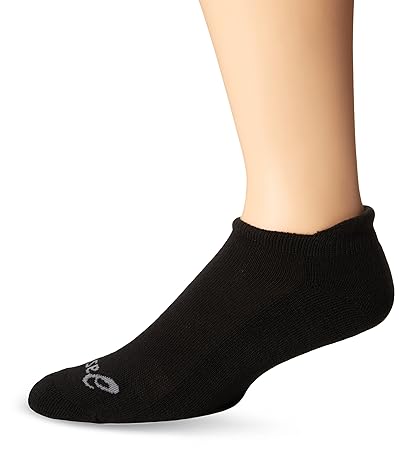
The Asics Cushion Low Socks are my go-to socks for running.
They are snug on my feet yet lightweight, deal compression around the middle, cushion the ball of your feet, and are made of thin cotton.
I rely on Asics as a brand name because of the quality of the running shoes they are understood for, so I presumed they would make a quality running sock.
For example, if you buy a brand-new vehicle, you will not purchase a brand name you have never heard of or are unfamiliar with.
You wish to purchase a trustworthy brand name that you are comfortable with and trust.
ASICS Cushion Low Cut (3 Pack), Grey Heather, Small
ASICS Unisex Cushion Low Cut (3 Pack) Running Socks, M, HAZARD GREEN/LAKE DRIVE MULTI
Read Next – Best Fit Running Socks Available in 2022
Bridgedale Men’s Trail Run Ultralight T2 Merino
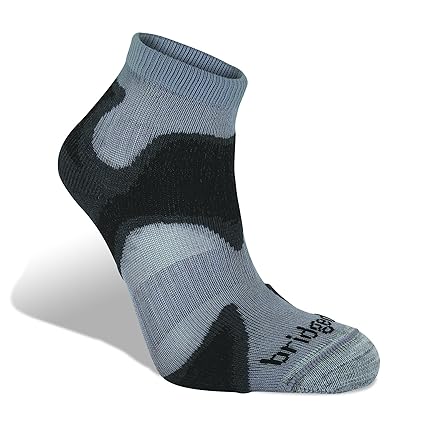
The Bridgedale Men’s Trail Run Ultralight Socks were the 2nd kind of sock I attempted throughout my “blister mess.
These are created with an anti-blister innovation called “Double Loop Cushioning,” an elegant term for “more cushioning.”
These socks have more assistance on the heel and balls of your feet and a comfy compression feel.
Furthermore, the material is breathable and handles wetness simply outstandingly.
I had a little sweat on my feet after using these for my longer runs; however, these are quality socks that prevent blisters.
The Bridgedale Men’s Trail Run Ultralight is great for blister defense for runners.
Bridgedale Men's Cross Country Ski - Merino Endurance Socks, Black, X-Large
Bridgedale Unisex Cross Country Race Merino Fusion Winter Sport Socks, X-Large, Black/Stone with Sock Ring
Read NEXT – Best Men’s Dress Socks
Injinji Run No-Show Toes Socks
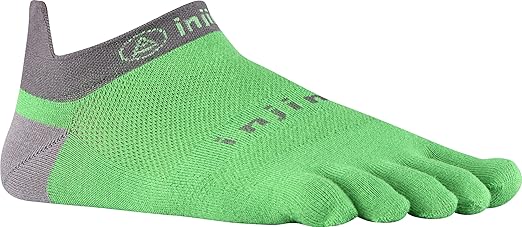
Initially, I was reluctant to use toe socks. After seeing the 770+ reviews on Amazon about the convenience, blister security, and decreasing wetness, I offered the Injinji Toe Socks a shot.
I am not a “toe shoe” type of runner, so this purchase was out of character for me; however, I truly wished to attempt a couple of various kinds of socks that would assist with my blister issue.
Moreover, putting my toes in each right area was a little challenging.
The lightweight variation is a little thinner than the Asics and Bridgedales.
I discovered that Split Toe Socks’ advantages are the additional defense for your toes and the general convenience.
They are comfy socks when you surpass the odd sensation of your toes being separated in their location.
Split Toe Socks’ design is developed to fit like a glove for your feet and prevent blisters.
Injinji Run Lightweight No-Show (Large, Black)
Injinji 2.0 Men's Run Midweight No Show Toesocks, Black/Gray, Medium
Read NEXT – Best Socks For Sweaty Smelly Feet
Wrightsock Anti-Blister Double Layer Running Quarter Sock
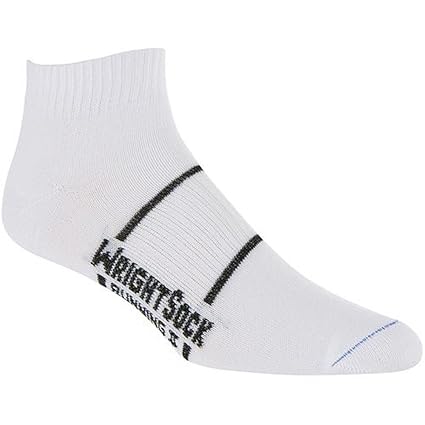
The Wrightsock Anti-Blister Double Layer Running Socks were the last running socks I evaluated.
Aside from a long title, these socks were great for blister defense.
After offering these a month-long trial, I enjoyed the convenience and tight fit on my feet.
I believed my feet would sweat a heap more; however, they did not.
Many runners utilize these in a mix with Vaseline to supply supreme defense from blisters/chaffing. I did not attempt to explore these socks.
Wrightsock Coolmesh II Lo Quarter Blister Free Socks - Lightweight, Breathable All Day Travel & Activity Small, Lucite
Wrightsock Coolmesh II Lo Blister Free Socks- Great for Hiking Running Walking Lightweight Breathable Durable Dry Grey, Small
Wrightsock Escape Quarter Socks, Guaranteed Blister Free, Lightweight Breathable, Women and Men, Perfect Work and Sport, Small, Black Twist
Read Next – Best Soccer Socks Walmart Our Top Picks
Drymax Sport Socks

Drymax Sport Socks’ claim to popularity is how they keep your feet cool and dry. The extensive brand-name running shops regularly suggest these socks.
For me, these were the most resilient out of all of the socks I acquired to ease my blister issue.
They have a double-layer wetness elimination system, simply two thin layers that help your feet breathe and expel sweat when running.
These running socks provide blister defense, and I have utilized every one of these on my runs.
I attempted five sets to obtain the best feeling I could find; a tight fit kept my feet dry, odor down, and no blisters.
Drymax Low Cut Running Socks for Men and Women (3 Pairs) | Super Breathable Performance Keep Feet Dry, Comfy and Blister-Free, S, White, Thinnest
Drymax Hyper Thin™ Running v4 No-Show 3-Pair Pack Black MD (US Men's Shoe 6-8, Women's Shoe 7.5-9.5)
R-Gear Drymax Low Cut Running Socks For Men and Women, Medium Cushion | Breathable, Moisture Control & Anti Blister | S, White, 3 Pack
Drymax Sport Lite Mesh No Show 3-Pair White/Grey MD (US Men's Shoe 6-8, Women's Shoe 7.5-9.5)
R-Gear Drymax No Show Running Socks For Men and Women, Medium Cushion | Breathable, Moisture Control & Anti Blister | M, White, 3 Pack
How did I get to the point of figuring out precisely what socks are the best to prevent blisters?
When I began running, I would get blisters on the front of my toes (listed below the nail) and at the top of my toes (it was a double-whammy, and it injured me!). I never believed that it was an outcome of dreadful socks.
After about two months (and many blisters) of going through these concepts, it struck me. I require brand-new socks.
The best socks can make the whole world of distinction if the sizing is off. It can produce friction as the socks rub against your skin.
If they are, believe they can make your feet hot and sweaty.
These are all fantastic indications that you must select a great set of running socks.
Read Next – Women’s Walking Shoe Sock Sneakers
How To Stop Blisters When Wearing New Shoes
Read Next – Best Soccer Socks to Prevent Blisters
Conclusion
Blisters can be excruciating and can make walking or running uncomfortable. Luckily, by choosing the right socks to prevent blisters, you can avoid this discomfort altogether.
When it comes to selecting the best socks for preventing blisters, there are many options available. Whether you choose synthetic materials, natural fibers like wool or cotton, or a combination of both, ensure your chosen sock fits well and has appropriate cushioning in high-impact areas.
To further reduce the risk of developing blisters while wearing socks, ensure your feet are clean and dry before putting them on. Additionally, try using an anti-chafing balm on any problem areas before undertaking any physical activity.
Following these blister prevention tips when wearing socks and selecting the right pair of socks that suit your needs will help keep those pesky blisters at bay!
How to Prevent Blisters with the Right Socks
Understanding the Causes of Blisters
Blisters are often the result of friction and moisture on the skin, particularly on the feet. Continuous rubbing of the feet against the socks and shoes can lead to painful blisters that can affect performance and overall experience.
Choosing the Right Material for Your Socks
One of the critical factors in preventing blisters is selecting the appropriate material for your socks. Look for moisture-wicking fabrics such as merino wool or synthetic blends that effectively wick away moisture from the skin, keeping your feet dry and comfortable.
Importance of Moisture-Wicking Properties
The moisture-wicking properties of socks play a crucial role in keeping your feet dry. Moisture accumulation can lead to blisters, so investing in socks that efficiently wick away moisture can significantly reduce the risk of blisters.
Top Features to Look for in Running Socks
Cushioning and Padding for Impact Protection
Running socks with adequate cushioning and padding provide impact protection, reducing the impact on your feet during each stride. This feature helps prevent blisters by minimizing the pressure and friction on the skin, especially during long-distance runs.
Friction-Reducing Design for Blister Prevention
The design of the socks should focus on reducing friction against the skin. Look for seamless or low-friction construction that minimizes rubbing and irritation, ultimately preventing blisters from forming.
Supportive Compression for Enhanced Performance
Compression socks offer supportive benefits for runners by promoting better circulation and reducing muscle fatigue. Additionally, the compressive fit can help prevent blisters by minimizing excessive movement within the shoes.
Benefits of Anti-Blister Socks for Hiking
Distinguishing Features of Blister-Preventing Socks
Anti-blister hiking socks are designed with specific features to prevent blisters. Look for reinforced heel and toe areas, which provide added protection and durability in high-friction areas, reducing the risk of blisters during hiking adventures.
Exploring Options for Lightweight and Durable Socks
Regarding hiking, lightweight and durable socks are essential for experiencing blister-free adventures. Opt for socks made from high-quality, durable materials that offer the right balance between breathability and protection.
Understanding the Importance of Heel and Toe Protection
The structure of hiking socks plays a vital role in protecting the heel and toe areas, which are prone to friction and pressure during hiking. Quality hiking socks with targeted cushioning and protection in these areas can effectively prevent painful blisters.
Hylaea No Show Running Athletic Anti-Blister Wicking Coolmax Socks, Seamless Anti-odor (3 Pairs Green/Blue/Orange, Large)
AKASO Crew Athletic Running Coolmax Socks, Anti-Odor Moisture Wicking Anti-Blister Seamless Socks for Hiking Men and Women (2 Pairs) (Black M)
Teebulen Women 6-Pack Mixed Anti Odor Blister Resisting Sweat Wick Low Cut Cotton Sports Running Socks,Size 4-8
$24.99 in stock
Comparing the Best Socks for Blister Prevention
The Advantages of Darn Tough Socks
Darn Tough socks are renowned for their durability and exceptional blister-prevention properties. With seamless construction and moisture-wicking capabilities, these socks offer unmatched comfort and protection for runners and hikers alike.
Exploring the Benefits of Tab Socks for Running
Tab socks for running are designed with a unique tab feature that prevents the socks from slipping into the shoes. This design minimizes friction and irritation, making them an excellent choice for runners seeking blister-preventing socks.
Assessing the Performance of Wrightsock in Blister Prevention
Wrightsock has gained recognition for its double-layer construction, effectively reducing friction and preventing blisters. The innovative design and moisture-wicking properties make Wrightsock a top choice for individuals prioritizing comfort and performance.
Expert Tips for Choosing the Ideal Socks
Blisters can be a runner’s or hiker’s worst enemy, causing discomfort and pain. Understanding the causes of blisters and how the right socks can help prevent them is crucial for anyone who enjoys these activities.
This comprehensive guide will delve into the factors contributing to blister formation and provide insights into the best running and hiking socks for blister prevention.
Understanding the Difference Between Thickness and Breathability
When selecting socks for blister prevention, consider the balance between thickness and breathability. A thicker sock may offer more cushioning but can increase moisture retention, while a breathable sock can effectively wick away moisture, reducing the risk of blisters.
Maximizing Comfort and Protection with the Right Fit
The right fit is crucial for maximizing comfort and protection. Ensure the socks provide a snug yet comfortable fit, avoiding any excess material that may cause friction. A proper fit is essential for preventing blisters and maintaining overall foot health.
Utilizing Socks with Seamless Technology for Enhanced Performance
Socks with seamless technology minimize potential friction points, enhancing overall performance and preventing blisters. The absence of seams reduces the chances of irritation, making seamless socks an excellent choice for individuals seeking ultimate blister prevention during physical activities.
What Causes Blisters and How Socks Can Help Prevent Them
Understanding the Formation of Blisters
Friction and moisture are the primary culprits behind blister formation. When the skin is repeatedly rubbed or pressed, such as during running or hiking, it separates the layers of the skin, resulting in a painful blister.
How Socks Can Minimize Friction and Prevent Blisters
Choosing the right socks, particularly those with anti-blister properties can significantly reduce friction between the skin and the sock. This minimizes the likelihood of developing blisters during physical activities.
The Importance of Moisture-Wicking Properties in Socks
Moisture-wicking socks keep feet dry by effectively wicking away sweat and moisture. This feature is essential in preventing blisters as excess moisture contributes to friction, which, in turn, can lead to blister formation.
Hylaea No Show Running Athletic Anti-Blister Wicking Coolmax Socks, Seamless Anti-odor (3 Pairs Green/Blue/Orange, Large)
AKASO Crew Athletic Running Coolmax Socks, Anti-Odor Moisture Wicking Anti-Blister Seamless Socks for Hiking Men and Women (2 Pairs) (Black M)
Teebulen Women 6-Pack Mixed Anti Odor Blister Resisting Sweat Wick Low Cut Cotton Sports Running Socks,Size 4-8
$24.99 in stock
Choosing the Best Running Socks for Blister Prevention
Factors to Consider When Selecting Running Socks
Factors such as cushioning, compression, and moisture-wicking capabilities should be considered when selecting running socks for blister prevention. A well-padded sock with snug compression and excellent moisture management can significantly reduce the risk of blisters.
Top Features of Anti-Blister Socks
A good anti-blinker running socks should offer seamless construction, breathable materials, and effective moisture-wicking properties. These features contribute to a comfortable and blister-free running experience.
Comparing Different Brands and Their Blister-Preventing Technologies
Several brands like Balega Blister Resist, Darn Tough, and Wrightsock are known for their advanced blister-preventing technologies. Comparing the unique features of each brand’s socks can help runners choose the best option for their specific needs.
Hiking Socks: How to Keep Your Feet Blister-Free on the Trails
The Impact of Cushioning and Compression in Hiking Socks
The impact of cushioning and compression in hiking socks cannot be overstated for hikers. A well-cushioned sock with appropriate compression can minimize friction and reduce the likelihood of painful blisters, especially during long hikes.
Exploring the Benefits of Darn Tough and Wrightsock for Hiking
Brands like Darn Tough and Wrightsock offer hiking-specific socks with unique features tailored to provide optimal comfort and blister prevention on the trails. Their use of merino wool and advanced padding technologies make them popular choices among avid hikers.
Lightweight Socks vs. Heavyweight Socks for Hiking: Which Is Better for Blister Prevention?
Regarding blister prevention, the debate between lightweight and heavyweight socks continues. While both types have merits, lightweight hiking socks are often preferred for their breathability and ability to keep feet cool and dry, ultimately reducing the risk of blisters.
Understanding the Role of Seam and Heel Construction in Blister Prevention
The Influence of Seam-Free Design on Blister Formation
Seamless socks are highly effective in preventing blisters, as they eliminate the potential for irritation caused by seams rubbing against the skin. The absence of seams minimizes friction and reduces the likelihood of painful blisters.
How Heel Construction Affects Blister Prevention
The construction of the heel in a sock can impact its ability to prevent blisters. A well-designed heel with adequate cushioning and a snug fit can prevent friction and keep the heel area free from blisters.
Impact of Sock Fit and Compression on Blister Formation
The right fit and compression of a sock are crucial in preventing blisters. Too loose can cause rubbing and friction, while socks with proper compression can provide support and reduce the risk of blisters.
Hylaea No Show Running Athletic Anti-Blister Wicking Coolmax Socks, Seamless Anti-odor (3 Pairs Green/Blue/Orange, Large)
AKASO Crew Athletic Running Coolmax Socks, Anti-Odor Moisture Wicking Anti-Blister Seamless Socks for Hiking Men and Women (2 Pairs) (Black M)
Teebulen Women 6-Pack Mixed Anti Odor Blister Resisting Sweat Wick Low Cut Cotton Sports Running Socks,Size 4-8
$24.99 in stock

